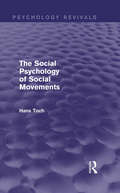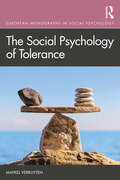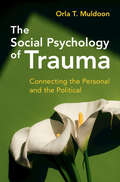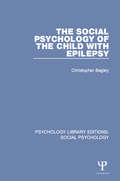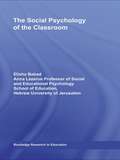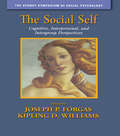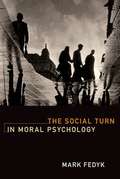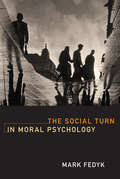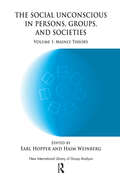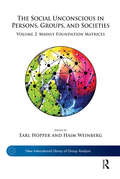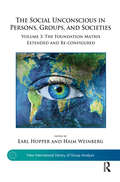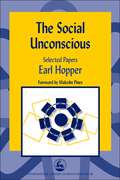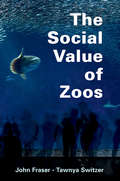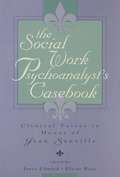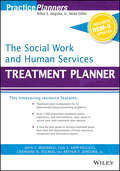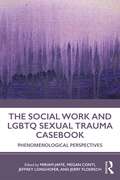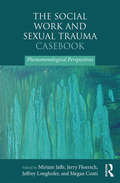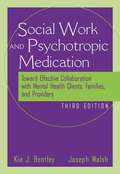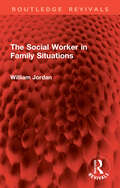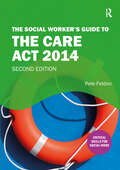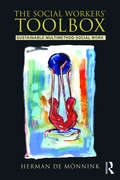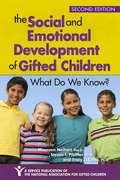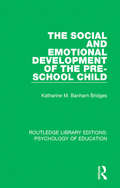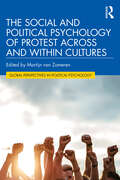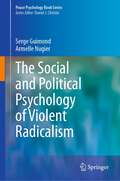- Table View
- List View
The Social Psychology of Social Movements (Psychology Revivals)
by Hans TochThe social movements that Professor Toch examines in this book, originally published in 1966, range from the Black Muslims to food faddists, and the founders of these movements range from Hitler to Joan of Arc. Why do people join social movements? How do such movements serve the needs of their members, and what unique social problems do they cause? What are the typical consequences of membership? What gives rise to social movements, and how can we evaluate them? In The Social Psychology of Social Movements Hans Toch provides answers to these questions. It is impossible to avoid in a study of this sort the universal human implications of social movements, the latent tragedy and despair which involvement in such collective action implies. The humour, adversity and pathos is equally evident in many of the examples which Professor Toch describes. But he provides a sympathetic objectivity, and is at pains to provide a systematic psychological survey of large, ideologically orientated groups and their members in general.
The Social Psychology of Tolerance (European Monographs in Social Psychology)
by Maykel VerkuytenThis highly topical book is the first of its kind to provide a comprehensive theoretical and empirical discussion of the social psychology of tolerance, exploring the importance and drawbacks of a focus on tolerance and discussing how tolerance can be stimulated in a range of contexts. The importance of tolerance for a diverse, equal, and open society is increasingly recognized by social and behavioural scientists. When people are aware of salient differences and disagree about the value of various viewpoints and ways of life, the question of tolerance arises. Not only in relation to religious, cultural, ideological, and viewpoint differences but also concerning everyday things such as annoying habits of one’s partner, the views and behaviour of one’s children, disagreements at work, and neighbourhood hassles. Verkuyten uses concrete examples to discuss the various reasons for why tolerance is vital for peaceful communities, especially in our increasingly diverse and polarized world. Providing a thorough examination of the social psychology of tolerance, this is a valuable text not only to social psychologists but to a range of students and scholars in the social and behavioural sciences more broadly.
The Social Psychology of Trauma: Connecting the Personal and the Political
by Orla T. MuldoonMany of us have been affected by trauma and struggle to manage our health and well-being. The social psychological approach to health highlights how social and cultural forces, as much as individual ones, are central to how we experience and cope with adversity. This book integrates psychology, politics, and medicine to offer a new understanding that speaks to the causes and consequences of traumatic experiences. Connecting the personal with the political, Muldoon details the evidence that traumatic experiences can, under certain conditions, impact people's political positions and appetite for social change. This perspective reveals trauma as a socially situated phenomenon linked to power and privilege or disempowerment and disadvantage. The discussion will interest those affected by trauma and those supporting them, as well as students, researchers, practitioners, and policy makers in social psychology, health and clinical psychology, and political science. This title is available as open access on Cambridge Core.
The Social Psychology of the Child with Epilepsy (Psychology Library Editions: Social Psychology)
by Christopher BagleyWhen this title was first published in 1971, there were about 300, 000 people with epilepsy in England and Wales. Nearly one-third of them were children. This book is an integrated review of how epileptic children behaved, and of how they were regarded by parents, teachers and peers at the time. Written by a sociologist with a training in psychology, human biology and education, the book draws on several disciplines – sociology, psychology, biology – in seeking to understand the complex determinants of deviant behaviour in children with epilepsy. The author considers in detail the lives of 118 epileptic children, bringing together and analysing a wide range of measurements of behaviour, social relations and abnormalities of brain function. He discusses how the children fare in school, and how epilepsy affects both the teacher’s perception of the child and the child’s scholastic performance. The dearth of medical centres which could diagnose and treat epilepsy at the time is examined, and hospital use according to parents’ social class is analysed. The author looks at the role of parents of epileptic children and shows that their attitude to epilepsy is of major importance for the child’s adjustment. The prejudice to which epileptic children and adolescents were subjected by the world at large is chronicled in detail. Finally the author considers how his empirical material makes a contribution to the theoretical problem of integrating sociology, psychology and biology into a single discipline concerned with the explanation of human social behaviour.
The Social Psychology of the Classroom (Routledge Research In Education Ser.)
by Elisha BabadTeachers often find that their training has not provided them with sufficient knowledge and understanding about underlying social forces and processes in their classrooms. This new book addresses this gap by focusing on the social psychology of the classroom, providing the relevant social psychological knowledge and facilitating the application of
The Social Self: Cognitive, Interpersonal and Intergroup Perspectives (Sydney Symposium of Social Psychology #Vol. 4)
by Kipling D. Williams Joseph P. ForgasWhat is the nature of the 'self', how do everyday experiences shape it, and how does it influence our thinking, judgements and behaviors? Such questions constitute enduring puzzles in psychology, and are also of critical practical importance for applied domains such as clinical, counseling, educational and organizational psychology. In this book a select group of eminent international researchers survey the most recent advances in research of the self. In particular, they discuss the influence of cognitive and intra-psychic processes (Part 1), interpersonal and relational variables (Part 2), and inter-group phenomena on the self (Part 3).
The Social Turn in Moral Psychology
by Mark FedykIn this book, Mark Fedyk offers a novel analysis of the relationship between moral psychology and allied fields in the social sciences. Fedyk shows how the social sciences can be integrated with moral philosophy, argues for the benefits of such an integration, and offers a new ethical theory that can be used to bridge research between the two. Fedyk argues that moral psychology should take a social turn, investigating the psychological processes that motivate patterns of social behavior defined as ethical using normative information extracted from the social sciences. He points out methodological problems in conventional moral psychology, particularly the increasing methodological and conceptual inconsilience with both philosophical ethics and evolutionary biology. Fedyk's "causal theory of ethics" is designed to provide moral psychology with an ethical theory that can be used without creating tension between its scientific practice and the conceptual vocabulary of philosophical ethics. His account aims both to redirect moral psychology toward more socially realistic questions about human life and to introduce philosophers to a new form of ethical naturalism -- a way of thinking about how to use different fields of scientific research to answer some of the traditional questions that are at the heart of ethics.
The Social Turn in Moral Psychology (The\mit Press Ser.)
by Mark FedykAn argument that moral psychology can benefit from closer integration with the social sciences, offering a novel ethical theory bridging the two.In this book, Mark Fedyk offers a novel analysis of the relationship between moral psychology and allied fields in the social sciences. Fedyk shows how the social sciences can be integrated with moral philosophy, argues for the benefits of such an integration, and offers a new ethical theory that can be used to bridge research between the two. Fedyk argues that moral psychology should take a social turn, investigating the psychological processes that motivate patterns of social behavior defined as ethical using normative information extracted from the social sciences. He points out methodological problems in conventional moral psychology, particularly the increasing methodological and conceptual inconsilience with both philosophical ethics and evolutionary biology. Fedyk's “causal theory of ethics” is designed to provide moral psychology with an ethical theory that can be used without creating tension between its scientific practice and the conceptual vocabulary of philosophical ethics. His account aims both to redirect moral psychology toward more socially realistic questions about human life and to introduce philosophers to a new form of ethical naturalism—a way of thinking about how to use different fields of scientific research to answer some of the traditional questions that are at the heart of ethics.
The Social Unconscious in Persons, Groups and Societies: Mainly Theory (The New International Library of Group Analysis)
by Earl Hopper Haim WeinbergThe social unconscious is vital for understanding persons and their groupings, ranging from families to societies, committees to organisations, and from small to median to large therapeutic groups, and essential for comprehensive clinical work. This series of volumes of contributions from an international network of psychoanalysts, analytical psychologists, group analysts and psychodramatists draw on the classical ideas of Freud, Klein and Jung, Bion, Foulkes and Moreno, and on contemporary relational perspectives, self-psychology and neuroscience. Volume 1 is concerned mainly with the theory of the social unconscious. It is focused on topics such as location, sociality, the social brain, identity, ideology, the foundation matrix, social psychological retreats, false collective self-objects, the collective unconscious and its archetypes and social dreaming.
The Social Unconscious in Persons, Groups, and Societies: Volume 2: Mainly Foundation Matrices (The New International Library of Group Analysis)
by Earl HopperThe social unconscious is vital for understanding persons and their groupings, ranging from families to societies, committees to organisations, and from small to median to large therapeutic groups, and essential for comprehensive clinical work. This series of volumes of contributions from an international network of psychoanalysts, analytical psychologists, group analysts and psychodramatists draw on the classical ideas of Freud, Klein and Jung, Bion, Foulkes and Moreno, and on contemporary relational perspectives, self-psychology and neuroscience. Volume 2 is concerned mainly with the foundation matrices of the social unconscious. It is focused on topics such as transmission, trauma, the foundation matrix, the social unconscious, the collective unconscious, totalitarianism, massification, and identity formation. It also includes discussions of the foundation matrices of a number of countries including Germany, Brazil, Japan, Israel, Ireland, and the Czech Republic.
The Social Unconscious in Persons, Groups, and Societies: Volume 3: The Foundation Matrix Extended and Re-configured (The New International Library of Group Analysis)
by Earl HopperIn this book the authors develop the theory of the tripartite matrix, consider music as a form of non-verbal communication as a sub-dimension of the matrix, and to present empirical studies of the matrices of peoples in three societies in the Middle-East. The first volume of this series addressed the group analytic theory of the social unconscious, attempting to clarify the definition of the concept itself, indicating some of its main elements, and comparing it to the Jungian collective unconscious, the Morenoian co-unconscious, and to the study of the link and the bond by Pichon-Riviere (Hopper & Weinberg, 2011). The second volume considered the socio-cultural transmission of myths, and presented several empirical studies of the foundation matrices of contemporary societies, emphasising the importance of social trauma and the continuing consequences of them (Hopper & Weinberg, 2016). The study of these three volumes will provide an appreciation of the depth and breadth of this field of enquiry, which is at the very heart of the project of Group Analysis.
The Social Unconscious: Selected Papers
by Earl Hopper Malcolm Pines'In this text, Earl Hopper has made a major contribution to the understanding of the depth and breadth of individuals and how we might help them to know more of their patterns of relatedness with others, inter-personally, socially and culturally. Of particular note is the open honest manner of his consideration of his counter-transference and these can be clearly observed in the abundance of pertinent vignettes. This book draws attention to theory and practice in relation to a side of therapeutic work insufficiently attended to and will reward readers at all stages of professional development. It is written in a clear, accessible style and manages to convey complex ideas in a readily comprehensible manner'. - Psychotherapy and politics international 'The Social Unconscious represents a line of thinking whose time has come. From bullying and youth violence in schools, to bombings in our cities, to anti-semitic or anti-Muslim activities and other race or religious hatred, to anxieties, well founded or otherwise, about immigration - wherever we live, all of us are touched and shaped by these events... This book draws attention to theory and practice in relation to a side of therapeutic work insufficiently attended to and will reward readers at all stages of professional development. It is written in a clear, accessible style and manages to convey complex ideas in a readily comprehensible manner.' - Psychotherapy & Politics International 'Dr Hopper argues for the awareness of, and training in, the processes of what he terms the Social Unconscious, for all mental health professionals. Hopper provides insight into the multiple forces that affect us and how we may reorganize our constraints. Does Hopper simply find what he is looking for, or does he discover something new? I recommend readers take this book of essays seriously and make their own decision.' - Psychologist - Psychoanalyst 'A very timely selection of papers by Earl Hopper on a very timely subject... People need to recognize that we are not merely passive sufferers of our world, rather we constitute it and have the power to shape it to a great extent. Much of what goes on in that world is unconscious in spite of the fact that we make it, therefore the importance of the social unconscious has been in the centre of Earl's interest for a number of years, and he has become one of the best known exponents of it.' - Reflections 'This most timely book - with its ready application across disciplines in a world fragmented by group-induced conflicts and traumas - will, no doubt, stimulate many thoughts, feelings and new possibilities for integration.' - Mark Ettin, Group Psychotherapist and Group Relations Consultant, USA 'The Social Unconscious offers a carefully composed selection of the author's group analytic contributions... the complexities of sociology, group analysis and psychoanalysis are put in mutually enriching perspectives.' - Dieter Nitzgen, Psychoanalyst and Group Analyst, Germany 'This record will be a lasting contribution to the literature. He movingly records with startling honesty the details of his family background and current history with poetic grace, thus applying what he has learned of the social unconscious to his own practice.' - W. Gordon Lawrence, Group Relations and Organizational Consultant, UK 'Earl Hopper's writing contributes a penetrating and unique view of pathology rooted in society as well as in the individual psyche.' - Dennis Brown, Psychoanalyst and Group Analyst, UK The social unconscious and its manifestations in group analysis are the focus of this important new book of Earl Hopper's selected papers. Drawing on sociology, psychoanalysis and group analysis, he argues that groups and their participants are constrained unconsciously by social, cultural and political facts and forces. These hypotheses are illustrated with clinical vignettes concerning anti-Semitism, racism, the politics of class and gender, and the effects of rapid social change. Transference and countertransference processes are examined both vivid...
The Social Value of Zoos
by John Fraser Tawnya SwitzerCombining anecdotes with scientific data, this book is a journalistic inquiry into what is currently known about zoos and aquariums as sociocultural intersections of mission, public perception, and on-site meaning making. The authors draw on conservation psychology and other social science research to explore how zoos might develop and deliver more effective learning experiences to promote and nurture conservation values and collective action. While people use zoos with specific priorities and motivations in mind, these are social settings. Indeed, it is because they represent an important, vast, and trusted social enterprise that zoos have such powerful opportunities to change how diverse public audiences view, value, identify, and engage with animals and the broader biophysical environment.
The Social Work Psychoanalyst's Casebook: Clinical Voices in Honor of Jean Sanville
by Joyce Edward Elaine RoseThe Social Work Psychoanalyst's Casebook begins with an interview with Dr. Sanville, who reflects on her evolution as a social work analyst, theoretician, writer, teacher, and leader. These reminiscences are followed by accounts of nine analytic treatments, each of which offers an unusual window into what actually transpired between analyst and analysand during the treatment hours. These case studies concern particularly troubled, often traumatized patients-the very "hard to reach" or "difficult to treat" clients with whom social workers have long been familiar. They include a reanalysis by the same analyst of a patient whose first therapy ended in a stalemate; an account of transference and countertransference phenomena during termination; a report on the analysis of a young woman who experienced both chronic and stress-related trauma; and an account of the special issues involved in the treatment of an aging woman. Most of the case studies reflect the influence of Dr. Sanville, whose work has long evinced the therapeutic imagination and disciplined creativity to which all the contributors aspire. Tthe contributors to this volume offer the salutary reminder that analytic work is built on a relationship of respect and empathy and that treatment success follows from the therapist's willingness to accommodate the unique needs of individual patients. In honoring Jean Sanville, The Social Work Psychoanalyst's Casebook speaks to the robustness of a multidisciplinary approach to psychopathology that transcends the bounds of any single profession-an approach in which contemporary psychoanalysis is enlarged by the insights and emphases of social work just as social work is enriched by the clinical wisdom of psychoanalysis.
The Social Work and Human Services Treatment Planner, with DSM 5 Updates
by Arthur E. Jongsma Jr. Catherine N. Dulmus John S. Wodarski Lisa A. Rapp-PaglicciThis timesaving resource features: Treatment plan components for 32 behaviorally based presenting problems Over 1,000 prewritten treatment goals, objectives, and interventions--plus space to record your own treatment plan options A step-by-step guide to writing treatment plans that meet the requirements of most insurance companies and third-party payors The Social Work and Human Services Treatment Planner provides all the elements necessary to quickly and easily develop formal treatment plans that satisfy the demands of HMOs, managed care companies, third-party payers, and state and federal review agencies. Saves you hours of time-consuming paperwork, yet offers the freedom to develop customized treatment plans to address clients' psychological and environmental problems and issues Organized around 32 main presenting problems, from family violence and juvenile delinquency to homelessness, chemical dependence, physical/cognitive disability, sexual abuse, and more Over 1,000 well-crafted, clear statements describe the behavioral manifestations of each relational problem, long-term goals, short-term objectives, and clinically tested treatment options Easy-to-use reference format helps locate treatment plan components by behavioral problem or DSM-5 diagnosis Includes a sample treatment plan that conforms to the requirements of most third-party payers and accrediting agencies (including TJC and NCQA)
The Social Work and LGBTQ Sexual Trauma Casebook: Phenomenological Perspectives
by Jerry Floersch Jeffrey Longhofer Miriam Jaffe Megan ContiThis inspiring text offers a collection of case studies from expert clinical social workers who work closely with survivors of LGBTQ-related sexual trauma. The book covers a wide range of topics, such as gender and sexual minority asylum seekers, the embodiment of queer identity, the role of religion, regionality in the LGBTQ experience, and effective use of gay affirmative therapy. Each chapter is framed by key questions that encourage students and mental health practitioners to "think through" the specific needs and challenges of LGBTQ individuals who have experienced sexual trauma. Additional resources include an example of effective supervision and an example of a case conceptualization. Drawing on the importance of narrative social work and the record of experience it provides, The Social Work and LGBTQ Sexual Trauma Casebook is an essential text for students and clinical social workers working with LGBTQ survivors of sexual trauma.
The Social Work and Sexual Trauma Casebook: Phenomenological Perspectives
by Jerry Floersch Jeffrey Longhofer Miriam Jaffe Megan ContiThis volume offers a collection of ten case studies from clinical social workers who work in the field of sexual trauma, with the objective of challenging and informing social work practice with survivors and perpetrators of sexual trauma. These steps are meant to help the process of treatment by breaking down the experience of trauma to a set of steps and interventions aimed at resolving traumatic symptoms within a given time frame. Our text seeks to challenge the tendency towards reductionism inherent in the dominant social paradigm by encouraging the development of a phenomenological and interdisciplinary approach to understanding sexual trauma. In doing so, the examples of interventions presented in each case study reflect practice methods that honor the complexity of the human experience of sexual trauma, suffering, and recovery.
The Social Worker and Psychotropic Medication: Toward Effective Collaboration with Mental Health Clients, Families, and Providers (3rd edition)
by Joseph Walsh Kia J. BentleyIntended for social workers who want to understand the drugs prescribed to their clients, this text describes the central nervous system, the basic principles of pharmacology, and the specific disorders treated by antipsychotics, antidepressants, mood stabilizers, anti-anxiety drugs, and psychostimulants. The third edition reflects new medications and new uses of medications across diagnostic categories.
The Social Worker in Family Situations (Routledge Revivals)
by William JordanFirst published in 1972, The Social Worker in Family Situations sets out to provide a theoretical basis for the practice of the family casework approach. William Jordan studies those families whose members flee from emotional involvement with each other, stressing their individual autonomy and the dangers of close family ties. He concentrates on the problems of working with these ‘centrifugal’ families, examining the implications of their patterns of interaction not only within the nuclear family group, but also in the extended family, the neighbourhood and the community.The book will be of great interest to all social workers, including those who have practised the family casework approach for many years but have hitherto lacked the benefit of any helpful written guidance.
The Social Worker's Guide to the Care Act 2014
by Pete FeldonThis best-selling book helps social workers gain a comprehensive understanding of how to achieve best practice in applying the Care Act 2014.The Care Act 2014 is a pivotal piece of legislation for adults with social care needs. It is particularly important for social workers, as it sets out the legislative context for the core social work processes that apply to all adults.The Social Worker’s Guide to the Care Act 2014 is a thoughtfully crafted resource that places social workers at the centre of the legal landscape. It takes a distinctive approach by honing in on what truly matters to social workers: assessing needs and formulating care and support plans that align with eligible requirements.Through a blend of key concepts, case examples, and critical evaluation, the book enhances legal literacy in a way that empowers social workers. It equips social workers with a clear understanding of the legal framework within which they operate, enabling them to make informed professional judgements and apply their expertise effectively.This eagerly awaited second edition reflects extensive revisions based on valuable insights derived from judicial reviews, Ombudsman decisions, and in-depth research. Drawing from the author's extensive experience in providing training on the Care Act, the revised edition introduces two new sections that delve into the realms of professional judgement and defensible decisions—essential areas of focus for social workers. Additionally, it incorporates the amendments made to the Care Act 2014 by the Health and Care Act 2022.This substantially revised second edition of The Social Worker's Guide to the Care Act 2014 will be your invaluable companion in navigating the complexities of social work and will be a source of knowledge, empowerment, and guidance.
The Social Workers' Toolbox: Sustainable Multimethod Social Work
by Herman de MönninkThe Social Workers' Toolbox aims to bring order to the diversity of tools which are so characteristic of social work: assessment tools, practice tools and outcome-measurement tools. The tools described in this Toolbox can be directly put into practice and adapted to the social workers’ personalized approach with their individual clients and their environments. The underlying meta-theory for Sustainable Multimethod Social Work is the ‘PIE-Empowerment Theory’. This theory defines social work practice in terms of the partnership between social worker and client and is aimed at enhancing quality of life through systematically and sustainably addressing human needs and human rights. The multimethod model promotes the flexible combination of well-written evidence- and practice-based tools. Packed full of useful checklists, the Toolbox is ideal reading for both inexperienced and more practiced social workers. The book provides a solid basis through the use of practical examples. For the more experienced social worker it offers a substantial resource and the means to legitimize a chosen course of action and social work intervention. Schools of social work will be able to use the book as an easily accessible resource for social work assessments, interventions and quality social work management.
The Social and Emotional Development of Gifted Children
by Maureen Neihart Tracy Cross Steven PfeifferThe Social and Emotional Development of Gifted Children remains the only book that provides a comprehensive summary of the empirical research on the social and emotional development of gifted children by leading authorities in the field. It includes several features that make it the leading text on what we know about the social and emotional development of gifted children. For example, it summarizes the most significant findings from the empirical research on the topic. It also includes noteworthy variations that have been observed across cultural groups or global contexts. Each chapter also provides a short description of the practical applications that can be made from the research. This second edition includes an entirely new section on the psychosocial aspects of talent development, as well as addresses the burgeoning interest and research base regarding gifted performance. The text also includes several new topics that have emerged from the research in the past decade, such as the neuroscience of talent development and motivation for talent development. This book is a service publication of the National Association for Gifted Children.
The Social and Emotional Development of the Pre-School Child (Routledge Library Editions: Psychology of Education)
by Katharine M. Banham BridgesOriginally published in 1931, the study reported in this book was undertaken as part of the research programme of the Canadian National Committee for Mental Hygiene. It represents a systematic inquiry into the social and emotional behaviour of pre-school children as observed from day to day in a nursery school. The study extended over a period of three years, and it concerned children between the ages of two and five years who were in attendance at the McGill University Nursery School and child laboratory. It can now be read and enjoyed in its historical context.
The Social and Political Psychology of Protest Across and Within Cultures (Global Perspectives in Political Psychology)
by Martijn Van ZomerenThis topical book explores the phenomenon of when and why people protest. Based on social and political psychology, the book takes a comparative approach across and within cultures and examines how human motivation and political and cultural contexts affect protests.Showcasing state-of-the-art chapters from a new generation of social protest researchers, the book offers an overview of research into contemporary social change over the last decade. It draws on interdisciplinary research from social and political psychology across and within cultures to increase the scope of the phenomenon of social protest. The chapters feature different international examples and discuss diverse manifestations of social protest. Each chapter explicitly connects key insights to the practice and real-life relevance of social protest.The book offers a unique perspective of the when and why of social protest, and will be essential reading for students and academics in the fields of social psychology, political psychology, politics, and sociology, as well as anyone in behavioural and social sciences interested in social movements, social protest, and social change.
The Social and Political Psychology of Violent Radicalism (Peace Psychology Book Series)
by Serge Guimond Armelle NugierThis book provides a unique perspective on the perpetrators and victims of political violence, using original evidence from the deadly attacks perpetrated in Paris in 2015. Much of the current literature focuses on the perpetrators of such violence. This volume, however, offers a deeper analysis by focusing not only on the terrorists themselves but on understanding the reactions of the general population affected by such lethal acts. It provides a more detailed view of the opponents of terrorism, namely us, and explains how our own reactions can increase or decrease, the potential for political violence. Part I introduces the most relevant theories within social psychology and political psychology that are used to understand terrorism; Part II examines empirical evidence from a French context; and Part III discusses policy implications, with the prevention of political violence as a long-term goal. Finally, the volume offers a blueprint for a more appropriate conceptualization of terrorism as arising out of intergroup conflict suggesting ways to build a resilient society. This book will be of interest to researchers, teachers and students across social psychology, sociology, political psychology and political science.
